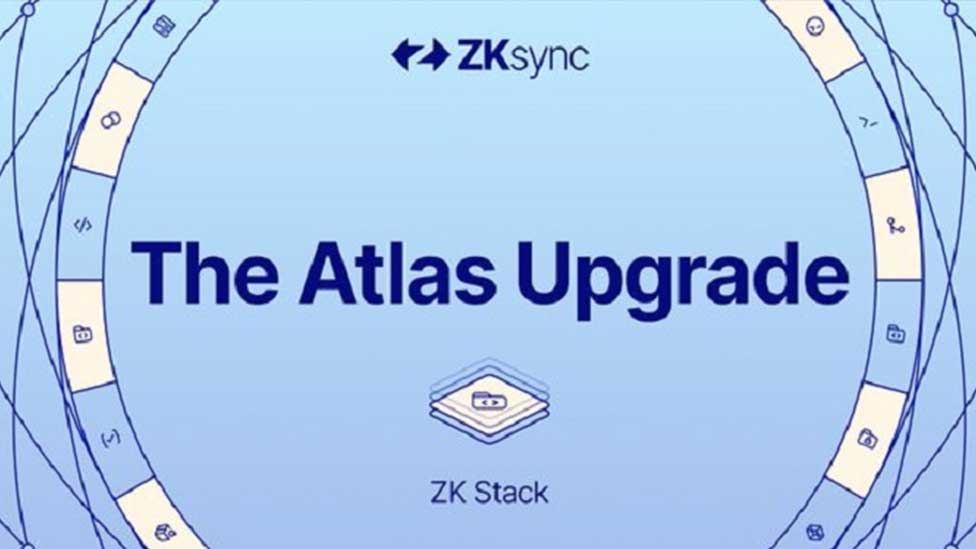ZKsync has officially launched Atlas, a powerful new upgrade to its ZK Stack framework, marking a major leap toward bringing blockchain technology into mainstream enterprise use. Developed by Matter Labs, the update is designed to help corporations, financial institutions, and large-scale organizations build secure, scalable, and interoperable blockchain networks tailored to their operational needs.
With Atlas, ZKsync aims to bridge the gap between traditional enterprise systems and decentralized blockchain environments, moving beyond its strong foundation in decentralized finance (DeFi) toward a broader ecosystem that supports institutional adoption.
A Framework Built for Institutional Scalability
The Atlas upgrade focuses on solving three of the biggest challenges that enterprises face when considering blockchain adoption — scalability, performance, and regulatory compliance. Matter Labs said that Atlas introduces a re-engineered foundation for ZKsync’s modular blockchain framework, improving proof efficiency, interoperability, and transaction throughput.
At the heart of this upgrade lies a new “Airbender” proof system, designed to deliver near-instant transaction confirmations and faster cross-chain settlements. The company’s engineering team explained that Airbender enhances both transaction reliability and interoperability across multiple blockchain environments, ensuring that enterprises can connect seamlessly with Ethereum and other ZK-based ecosystems.
In addition, Atlas integrates a high-performance sequencer capable of handling up to 30,000 transactions per second (TPS). This positions ZKsync as one of the most efficient Layer-2 (L2) solutions in the Ethereum ecosystem — a critical factor for institutions that process vast volumes of data and transactions daily.
Alex Gluchowski, CEO and co-founder of Matter Labs, said the new system provides the foundation for a “next-generation financial infrastructure.” He added that with Atlas, enterprises can now operate on-chain with the same flexibility and control as internal systems, while maintaining the transparency and immutability that only blockchain technology can provide.
Customizable and Secure Enterprise Chains
One of Atlas’s standout features is its customizable chain deployment capability. This allows organizations to launch private, public, or hybrid blockchains within the ZK Stack while retaining interoperability with Ethereum and other networks.
For many institutions, privacy and compliance are as critical as scalability. Atlas addresses this by giving organizations full control over governance, data ownership, and security settings. This flexibility enables enterprises to meet regulatory requirements without compromising on decentralization or connectivity to the broader Web3 ecosystem.
Matter Labs described this as a pivotal step toward merging Web2 enterprise infrastructure with Web3 innovation. The company envisions a future where global corporations, governments, and financial institutions can operate securely on-chain while leveraging zero-knowledge (ZK) technology to maintain confidentiality and performance at scale.
The new architecture also enhances modular design, allowing developers to easily integrate external tools, APIs, and compliance solutions. This adaptability makes Atlas suitable for use cases ranging from financial settlements and supply chain tracking to digital identity, asset tokenization, and cross-border trade.
Strengthening Security After a Challenging Year
The Atlas launch follows a turbulent year for ZKsync, marked by both major growth and key learning moments. In April 2025, the company experienced a $5 million security breach after a compromised admin account exploited an airdrop contract to mint 111 million ZK tokens.
Although user funds and the main network were not affected, the incident triggered widespread debate over smart contract governance and administrative privileges within decentralized systems. In response, ZKsync collaborated with SEAL 911 and several cryptocurrency exchanges to trace the attacker and strengthen its internal security architecture.
Matter Labs confirmed that several of these enhanced safeguards have been integrated into the Atlas upgrade. The new version features hardened governance mechanisms, multi-signature admin controls, and improved auditing tools to prevent similar incidents. By embedding these protocols directly into the framework, ZKsync aims to give enterprises a higher level of operational resilience and cybersecurity assurance.
Strategic Growth and Ecosystem Expansion
ZKsync’s push for enterprise adoption isn’t happening in isolation. The company has been steadily building an ecosystem through strategic partnerships and investments. In September 2025, ZKsync co-led a $19 million Series A funding round for Grvt, a decentralized exchange leveraging ZK technology to improve transaction privacy and speed.
The funding round, which included Further Ventures, EigenCloud, and 500 Global, valued Grvt at $150 million. Grvt plans to use ZKsync’s Validium chain to power low-cost, high-speed, and privacy-focused on-chain trading, with a particular focus on markets in Asia and the Middle East.
These partnerships reinforce ZKsync’s long-term vision of developing a network of enterprise-ready decentralized applications (dApps) that combine blockchain transparency with institutional-grade performance and compliance.
A New Era for Enterprise Blockchain
With Atlas, ZKsync is positioning itself as a leading force in enterprise blockchain infrastructure. The upgrade’s combination of speed, interoperability, and data privacy offers a clear path for large organizations to adopt blockchain technology without the performance or compliance limitations that have previously hindered mass adoption.
By integrating zero-knowledge proofs, advanced proof systems like Airbender, and flexible governance models, ZKsync is moving blockchain technology from experimental use cases to real-world enterprise deployment.
As global businesses seek ways to increase efficiency, reduce fraud, and comply with stricter digital regulations, platforms like ZKsync’s Atlas could play a pivotal role in shaping the next generation of decentralized, enterprise-ready ecosystems.
In essence, Atlas isn’t just an upgrade — it’s a blueprint for how the blockchain industry can evolve to meet the demands of institutional adoption, bringing transparency, scalability, and trust to the core of global digital infrastructure.




























